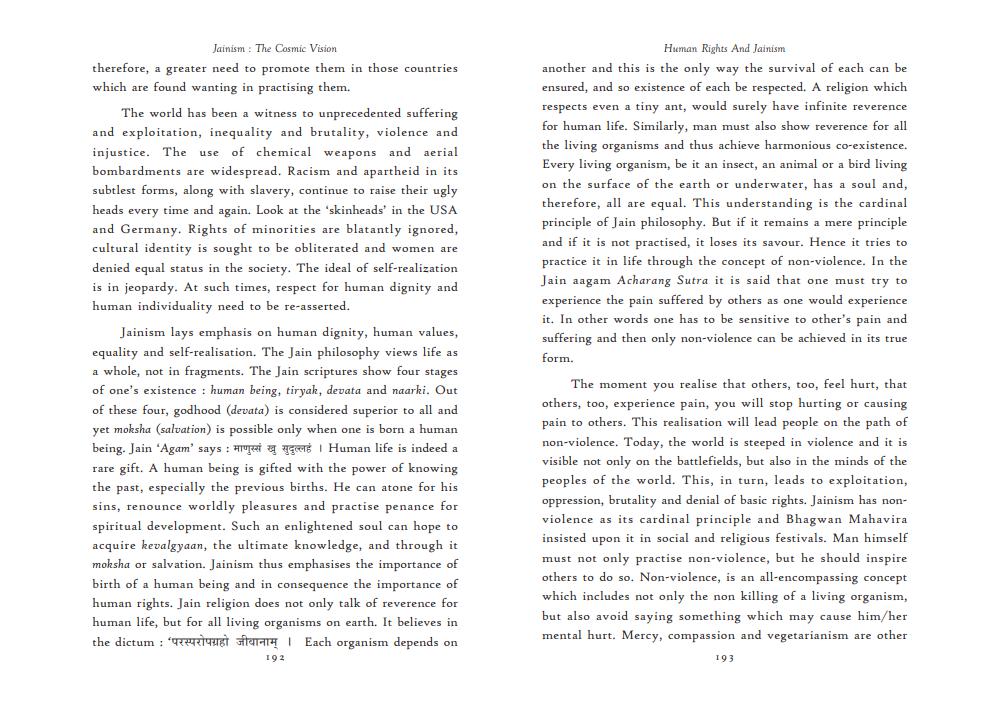________________
Jainism: The Cosmic Vision therefore, a greater need to promote them in those countries which are found wanting in practising them.
The world has been a witness to unprecedented suffering and exploitation, inequality and brutality, violence and injustice. The use of chemical weapons and aerial bombardments are widespread. Racism and apartheid in its subtlest forms, along with slavery, continue to raise their ugly heads every time and again. Look at the skinheads' in the USA and Germany. Rights of minorities are blatantly ignored, cultural identity is sought to be obliterated and women are denied equal status in the society. The ideal of self-realization is in jeopardy. At such times, respect for human dignity and human individuality need to be re-asserted.
Jainism lays emphasis on human dignity, human values, equality and self-realisation. The Jain philosophy views life as a whole, not in fragments. The Jain scriptures show four stages of one's existence : human being, tiryak, devata and naarki. Out of these four, godhood (devata) is considered superior to all and yet moksha (salvation) is possible only when one is born a human being. Jain 'Agam' says : Hopeat y Tag Human life is indeed a rare gift. A human being is gifted with the power of knowing the past, especially the previous births. He can atone for his sins, renounce worldly pleasures and practise penance for spiritual development. Such an enlightened soul can hope to acquire kevalgyaan, the ultimate knowledge, and through it moksha or salvation. Jainism thus emphasises the importance of birth of a human being and in consequence the importance of human rights. Jain religion does not only talk of reverence for human life, but for all living organisms on earth. It believes in the dictum : T T - Each organism depends on
Human Rights And Jainism another and this is the only way the survival of each can be ensured, and so existence of each be respected. A religion which respects even a tiny ant, would surely have infinite reverence for human life. Similarly, man must also show reverence for all the living organisms and thus achieve harmonious co-existence. Every living organism, be it an insect, an animal or a bird living on the surface of the earth or underwater, has a soul and, therefore, all are equal. This understanding is the cardinal principle of Jain philosophy. But if it remains a mere principle and if it is not practised, it loses its savour. Hence it tries to practice it in life through the concept of non-violence. In the Jain aagam Acharang Sutra it is said that one must try to experience the pain suffered by others as one would experience it. In other words one has to be sensitive to other's pain and suffering and then only non-violence can be achieved in its true form.
The moment you realise that others, too, feel hurt, that others, too, experience pain, you will stop hurting or causing pain to others. This realisation will lead people on the path of non-violence. Today, the world is steeped in violence and it is visible not only on the battlefields, but also in the minds of the peoples of the world. This, in turn, leads to exploitation, oppression, brutality and denial of basic rights. Jainism has nonviolence as its cardinal principle and Bhagwan Mahavira insisted upon it in social and religious festivals. Man himself must not only practise non-violence, but he should inspire others to do so. Non-violence, is an all-encompassing concept which includes not only the non killing of a living organism, but also avoid saying something which may cause him/her mental hurt. Mercy, compassion and vegetarianism are other
192
193




